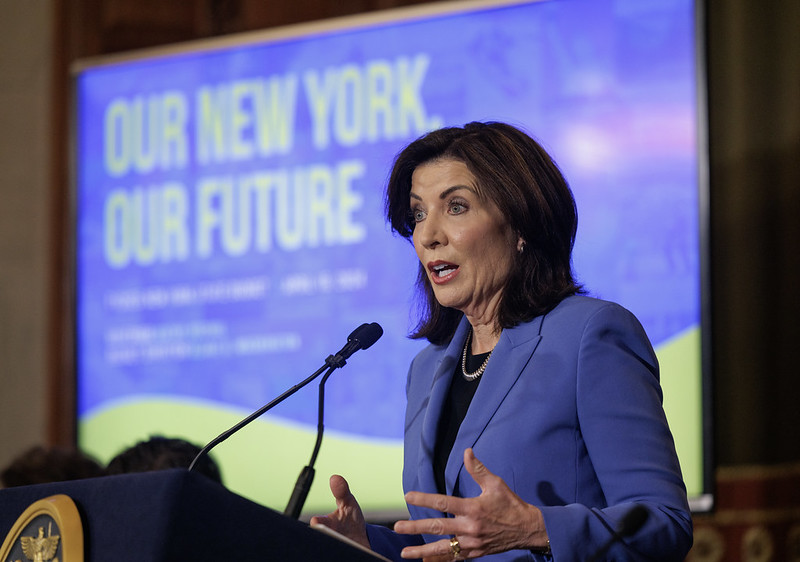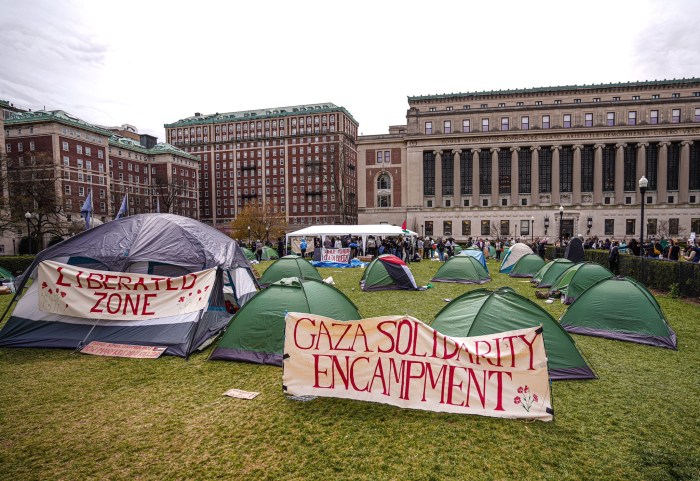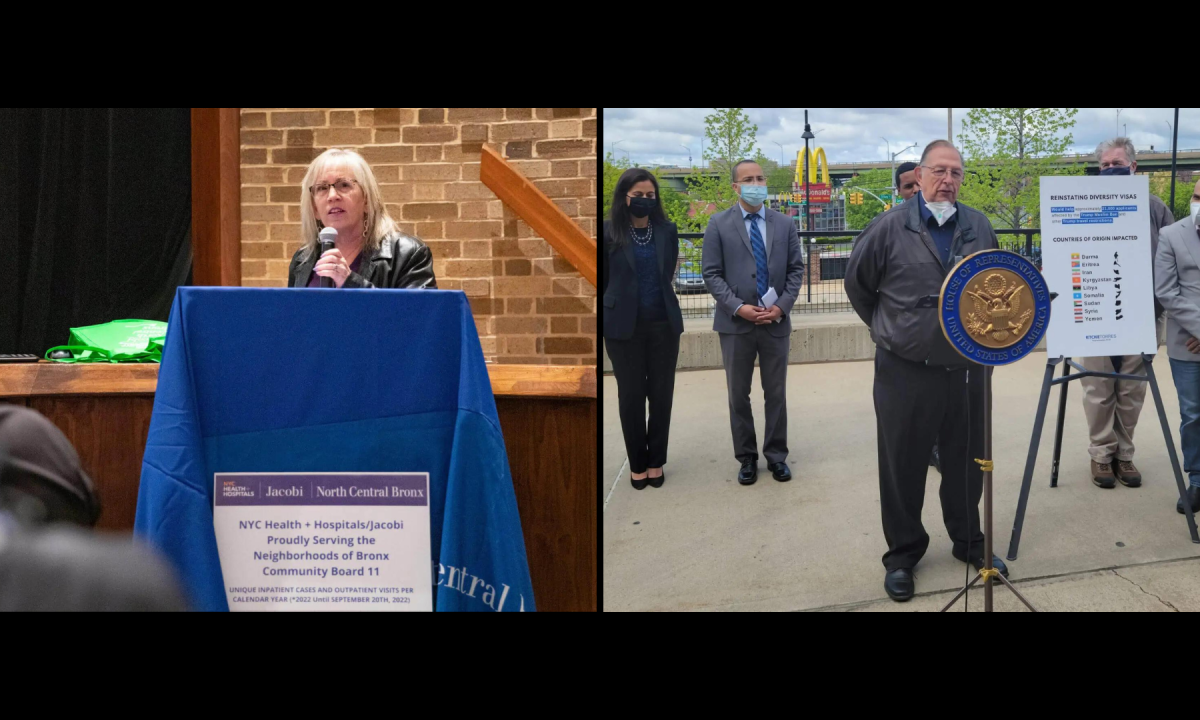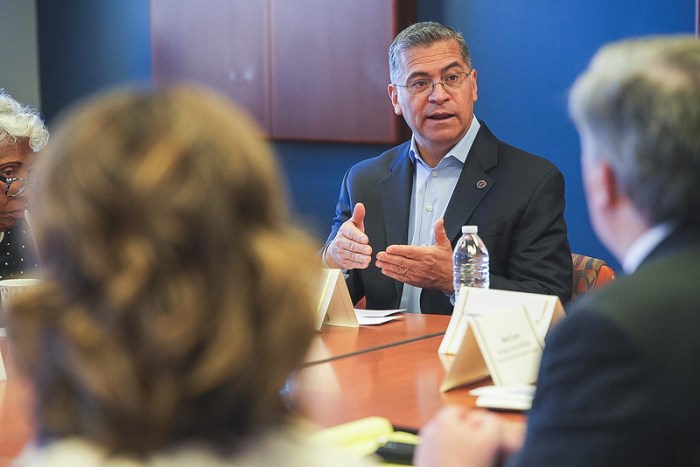Gov. Kathy Hochul on Monday afternoon announced the “parameters of a concept agreement” for a $237 billion Fiscal Year 2025 state budget — two weeks past the spending plan’s April 1 deadline.
But while Hochul said she, state Senate Majority Leader Andrea Stewart-Cousins and Assembly Speaker Carl Heastie all agreed to the tentative deal she announced in a Monday afternoon news conference, the state Senate was reportedly still debating the details of a housing plan at the same time.
The burgeoning final deal is roughly $4 billion higher than the $233 billion executive budget plan Hochul unveiled in January. It contains a broad housing package — some details of which were leaked over the weekend — along with measures to crack down on retail theft and unlicensed cannabis shops in New York City and $2.4 billion in migrant crisis aid for the city.
The plan notably does not include an increase in state income taxes for some of New York’s highest earners that were put forward by both houses of the state legislature, but fiercely opposed by Hochul.
Tbe governor acknowledged that reaching the agreement involved some “very tough conversations about how to change the entrenched status quo,” but that those talks led to “a blueprint for a safer, more affordable, more livable New York.”
The tentative deal announced Monday is a big win for Mayor Eric Adams, as it delivers on some of his top priorities.
“From the beginning of this process, we carried our bold agenda to Albany to achieve several key requests, including legislation that will allow New York City to build the affordable housing New Yorkers need and deserve, regulatory authority to finally close down illegal smoke shops plaguing our streets, and funding for the unprecedented migrant crisis that New York City has overwhelmingly shouldered,” the mayor said, in a statement.
But while Adams said he is “thrilled” with the agreement, he renewed his call for an extension of mayoral control of the city’s public schools. Although Stewart-Cousins earlier this month said mayoral control had been tabled until after the state budget process was over, Hochul — who is pushing for it to be included in the plan — said it is still part of the conversation.
Housing package
Hochul has been on a two-year journey to pass a sweeping deal that would address the diminishing supply of affordable housing across the state — especially in New York City. After the governor failed to reach an agreement with lawmakers on any significant housing reforms last year, she said the tentative deal this year accomplishes what she set out to do at the start of 2023.
“I’m really proud that the fiscal year 2025 budget achieves what so many said was impossible: a transformative deal to reverse the downward spiral on housing stock, all while protecting our tenants,” Hochul said.
Several items in the plan were pushed by Adams to boost housing growth in the five boroughs. Those include an extension of the 421-a affordable housing tax break for projects already in the pipeline for another six years; a new incentive to replace 421-a called 485-x; removing the 12 “Floor Area Ratio” (FAR) cap on residential building density; and making it easier to convert unused office space into housing.
On top of that, Hochul said the agreement contains tenants protections, but declined to go into specifics on exactly what those safeguards will look like.
Several reports over the weekend indicated the tenant protections would be a form of “Good Cause Eviction” legislation — which caps rent increases and limits landlords’ power to evict — with a number of carve-outs. Those include making the program op-in for municipalities outside of New York City instead of statewide, excluding new constructed and smaller buildings and making the rent increase caps less stringent.
Both tenant and landlord groups have come out in fierce opposition to the proposed agreement.
“Hochul’s Good Cause would be the weakest in the country as well as essentially unenforceable, denying millions of renters across the state basic protections from unfair rent hikes and evictions,” Cea Weaver, coalition director of advocacy group Housing Justice for All, said in a statement.
Real Estate Board of New York President James Whelan was not much happier with the deal, saying in a statement that while it had some positive aspects like the 421-a extension, many parts of it “falls far short of addressing the city’s housing needs and must be reassessed in the coming years to put the rental housing market on a solid footing.” He was particularly unhappy with the 485-x program, arguing it would produce less housing than its predecessor, and the inclusion of Good Cause.
Retail theft and Cannabis enforcement
The governor said the conceptual accord also includes public safety measures aimed at combating retail theft and the proliferation of unlicensed cannabis shops.
Hochul said the problem of retail theft has become so widespread that business owners and their employees have to “contend with brazen thieves who burst in, threaten people and rip their products off the shelves with impunity,” on a daily basis.
The plan would increase penalties on those who assault retail workers, a measure Hochul had pushed for in her budget proposal, but state legislative leaders were far less inclined to implement. It was not entirely clear how much penalties would be increased, but Hochul sought to make the assaults a felony.
Furthermore, the budget contains $4.2 million for local law enforcement to crack down on retail theft, and a $3,000 tax credit that business owners can use to invest in security enhancements.
Another persistent issue the plan seeks to address is the proliferation of thousands of unlicensed cannabis shops, mostly in the five boroughs, since the state legalized marijuana three years ago.
“They have plagued our neighborhoods, flagrantly violating our laws, selling to kids, evading taxes, and even offering products laced with unregulated chemicals,” Hochul said. “They needed to be shut down. We were up against thousands of illicit shops as well as bureaucratic inertia and didn’t have the laws on our side. So we changed the law so we can finally fight back.”
Those changes encompass giving both the state Office of Cannabis Management and localities the power to padlock illicit shops for up to a year. Hochul said the changes will not be visible right away, but over time they will clear the unlicensed sellers from storefronts, thus better positioning the state’s burgeoning legal market.
“They won’t disappear overnight, but eventually New Yorkers will see the change they’ve been waiting for in their communities,” she said. “This will clear the way for the Black, Latino, women immigrant, veteran and justice involved business owners who run the legal shops, the people our cannabis laws was intended to empower.”


















